Vegetarian and Vegan Onigiri in Japan: Which Types to Buy

Onigiri, or rice balls, are convenient snacks that are relatively cheap and widely available throughout Japan. This article explains how to identify vegetarian and vegan-friendly rice balls, where to find them, and what they contain.
Vegan and Vegetarian Rice Balls in Japan
Onigiri (rice balls ) are convenient snacks widely available in Japan and East Asia. You can buy them at any convenience store, supermarket, or your local kiosk in Japan. Priced affordably at around 100 - 130 yen apiece, they can be enjoyed on the go or together with other foods. Most types of onigiri in East Asia contain fish (or additional fish by-products), meat and eggs, making them not suitable for persons with vegetarian diets.
Some onigiri in Japan are made without these ingredients, however, which means that they can be enjoyed by many. Below is a summary of types of rice balls that can be considered to be vegetarian and vegan-friendly.*
*Secondary ingredients, such as flavor stabilizers, and the type of broths used in foods, are often not on ingredient labels of onigiri and food products in Japan. Those with allergies or who do not want to consume these potential ingredients should inquire directly with the manufacturer, or purchase vegetarian-certified food.
Plain Salted Rice Onigiri
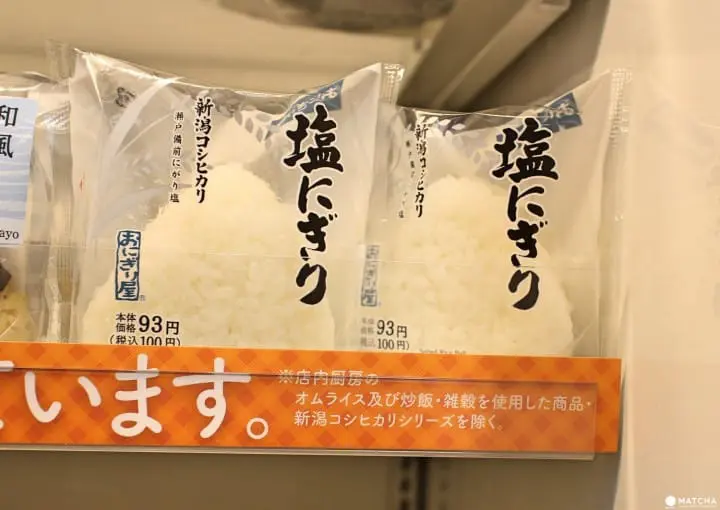
The simplest type of onigiri, the shio-musubi (salted plain rice ball) is made with no additional ingredients other than salt. It is available at all 7-Eleven, Lawson and Family Mart convenience stores. It will often be the cheapest rice ball in the shop, priced at around 100 yen.
Look for the character "塩" which means "salt," or "塩むすび" ("shio musubi" or salted rice ball). By choosing the one marked with this kanji, you make sure you won't have any uncomfortable surprises when you take the first bite. The plain salted onigiri is great combined with other convenience store foods such as salads or beans.
The plain salted rice onigiri is the only rice ball option at convenience stores that does not use broth, making it suitable for vegans and vegetarian customers.
Ume Onigiri
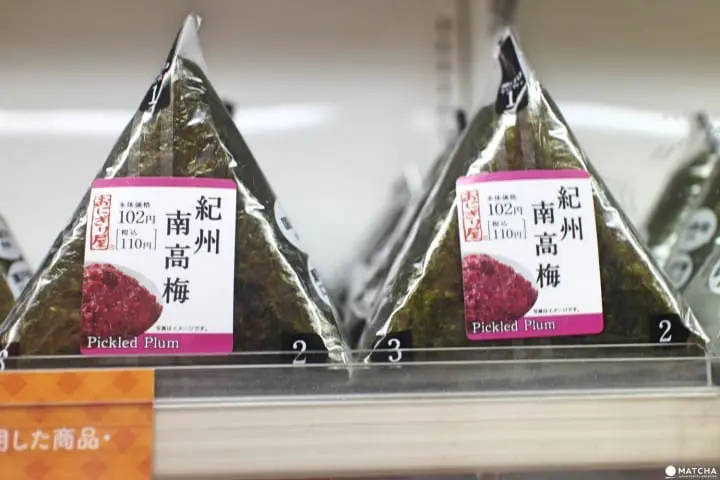
Pickled plum onigiri, or ume onigiri, is a rice ball with a pickled plum filling, wrapped in a sheet of nori (seaweed). There are several varieties of this onigiri - some of them are made with rice mixed with plum pieces, while other are made with plum jam, and there are even some with a smoky taste. There are even varieties that come without the nori wrapping. What you need to look for when choosing an ume riceball is the kanji 梅 (ume) or 梅干 (ume-boshi, or "pickled plum").
Please be aware that the broth used for flavoring this onigiri may contain fish. Those concerned with this should inquire directly, purchase a different item, or look for vegetarian or vegan-certified onigiri at a specialty store.
Konbu Seaweed Onigiri (昆布 or こんぶ)
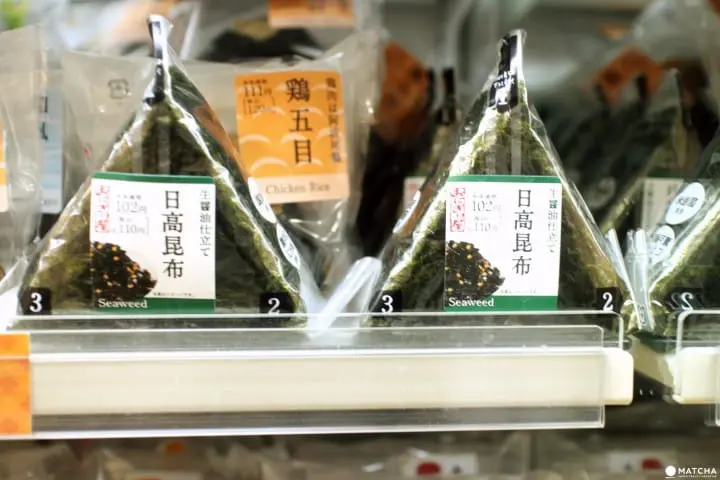
Konbu onigiri contains a filling made with a type of aromatic seaweed called "konbu." The konbu (kelp) is sweetened and tucked inside the rice ball, which is then wrapped in a nori seaweed sheet. This onigiri might have a strange taste if you are not used to eating kombu this way, but it is still a delicious treat if you are willing to give it a try.
Please be aware that the broth used for flavoring this onigiri may contain fish. Those concerned with this should inquire directly, purchase a different item, or look for vegetarian or vegan-certified onigiri at a specialty store.
Soy Sauce Yakimusubi Onigiri
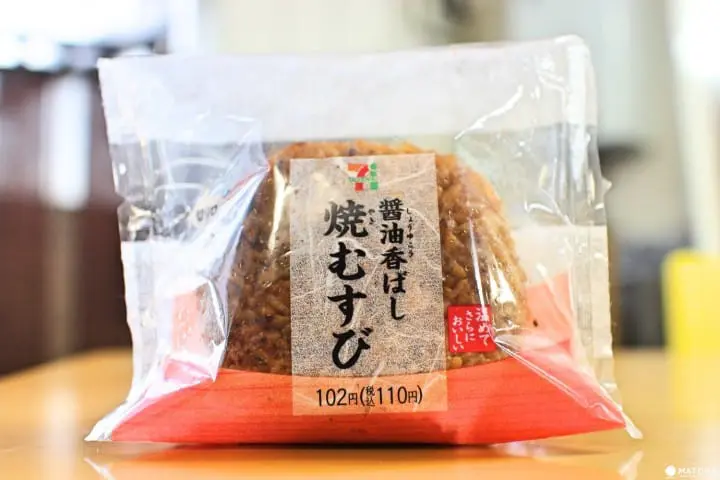
A somewhat plain rice ball without the usual nori wrapping, this onigiri is made with rice grilled in soy sauce ("shoyu" in Japanese - しょうゆ). Its ingredients are often just that . However, make sure you check whether it doesn't contain anything you might want to avoid by looking at the label. The 7-Eleven convenience store carries a popular type that is safe and completely free from animal ingredients.
Please be aware that the broth used for flavoring this onigiri may contain fish. Those concerned with this should inquire directly, purchase a different item, or look for vegetarian or vegan-certified onigiri at a specialty store.
Red Bean Onigiri
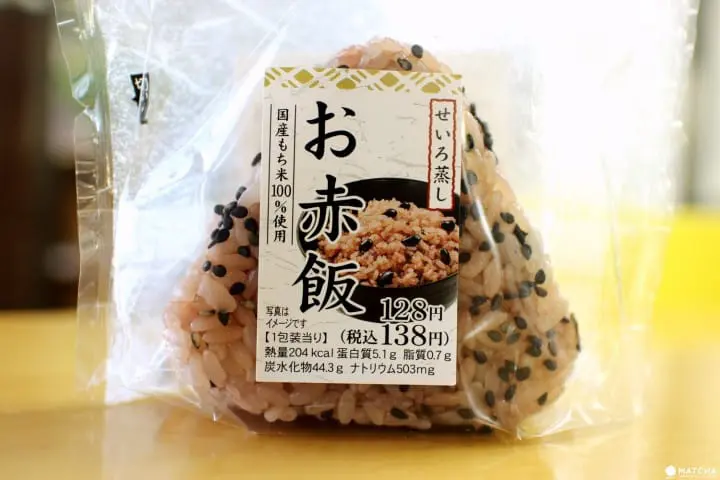
The sekihan onigiri, or red bean onigiri, is made with sticky rice and red sweet beans, with a seasoning of sesame seeds. This onigiri is also very popular in Japan and available at all convenience stores. The texture of this rice ball is sticky making it a bit different from the rest. Fairly safe on the ingredients side, this rice ball is easy to eat. This onigiri can be easily identified by the pinkish color of the rice, which is a result of it being cooked together with red beans.
Please be aware that the broth used for flavoring this onigiri may contain fish. Those concerned with this should inquire directly, purchase a different item, or look for vegetarian or vegan-certified onigiri at a specialty store.
Inari Sushi
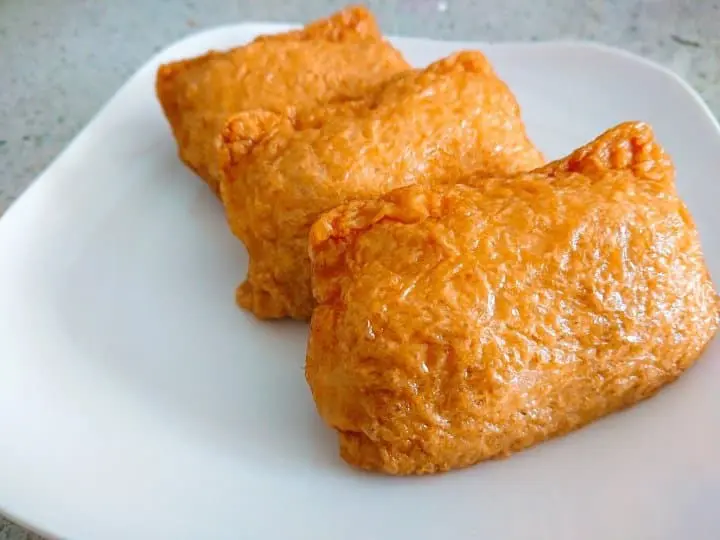
While Inari-zushi is not an onigiri, but a type of sushi, it is just as convenient because it can be enjoyed on the go. Inari-zushi is rice packed in fried tofu. While plain salted rice is used in onigiri, Inari-zushi will contain rice mixed with vinegar.
At convenience stores, you will often see Inari rice balls sold in a three-piece set, but they are also sold individually. The inari-zushi style rice balls that you find in convenience stores may be plain or have vegetables mixed with the rice.
Please be aware that the broth used for flavoring inari sushi may contain fish. Those concerned with this should inquire directly, purchase a different item, or look for vegetarian or vegan-certified onigiri at a specialty store.
Be Careful of Other Ingredients Being Contained
Remember that most of the convenience stores and supermarket rice balls do have a small picture on the pack displaying what’s inside it. Most onigiri sold at major convenience stores will have English descriptions in their names, making it easier for them to be selected. Rice balls at supermarkets and restaurants may not have any English on them, however.
If you are trying to avoid fish and animal ingredients, choose a non-fish/non-meat rice ball for a start. If you cannot eat fish products, be on the lookout for fish broth being contained in the rice by specifically paying attention to the kanji "鰹," which means katsuo (bonito fish). As mentioned above, rice balls may or may not contain this ingredient, which may not be listed on the label.
Discovering Japan by travelling.







































![[During Your Kumano Trip] Cape Shionomisaki Tourist Tower](https://resources.matcha-jp.com/resize/720x2000/2025/11/05-249097.webp)
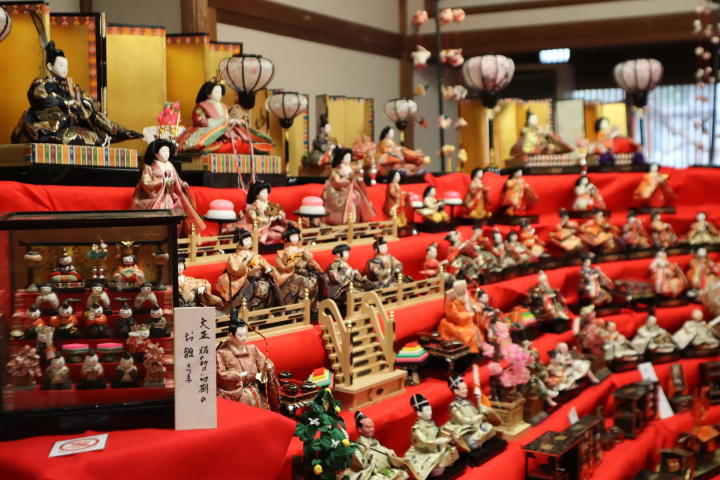
![[Kagoshima] Enjoy Minamisatsuma City to the Fullest! A Guide to the Scenic Beauty and Culture of Five Areas](https://resources.matcha-jp.com/resize/720x2000/2026/02/15-258755.webp)

![[Yufuin]Yufuin in 100 Minutes: Quick Access Guide](https://resources.matcha-jp.com/resize/720x2000/2026/02/15-258738.webp)